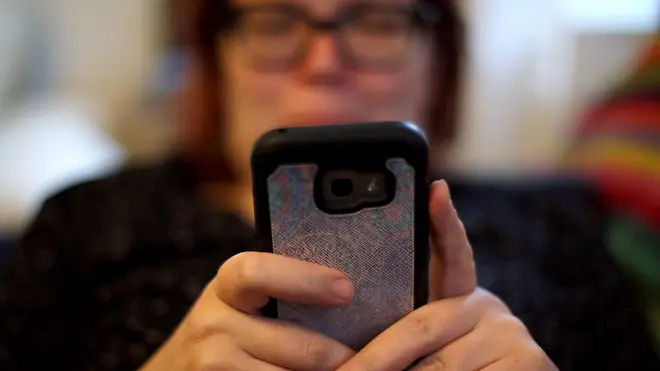
Clive Bull 1am - 4am
24 May 2022, 00:04

The average wait time was 10 minutes, 51 seconds, the Which? investigation found.
People who believe they may have fallen victim to fraud could be left hanging on some banks’ phonelines for as long as an hour, a Which? investigation suggests.
Fraud victims, including those defrauded by authorised push payment (APP) scams, where fraudsters trick people into sending them money unwittingly, are told to contact their bank’s fraud team immediately.
Getting through to a bank immediately can help to prevent further payments being made to fraudsters and may also make it easier to claw any lost funds back, as criminals often make money harder to trace by moving it through several bank accounts.
But a Which? investigation carried out in March found the average time to get through to banks and building societies when trying to report a fraud was 10 minutes and 51 seconds.
On two occasions (once with Santander and once with the Co-operative Bank) it took more than an hour for the call to be answered.
A Santander spokesperson said: “We have begun to see a clear shift in the complexity of scams and as the scams become ever more sophisticated, we are spending longer speaking with our customers to support them – whether it’s helping them to identify the fraud or helping them report the crime.”
Rocio Concha, Which? director of policy and advocacy, said: “The feeling of being scammed is already stressful enough for victims, without having to wait long periods just to get through to your bank.
“Victims are told to contact their bank immediately because every second counts.”
The best performing bank in the Which? investigation was First Direct, which took 16 seconds on average to put callers through to a member of staff.
First Direct’s quickest response time in the study was 10 seconds.
The worst performing bank in the investigation, the Co-operative Bank, took 31 minutes and 40 seconds on average.
The Co-operative Bank told Which?: “We experienced difficulties in recruitment and retention in a buoyant job market which, following increased levels of sickness and public health advice for those with Covid-19 symptoms, or a positive test to stay at home, resulted in increased call wait times.”
HSBC Premier service customers – who must have an annual income of at least £75,000 or savings and investments worth £50,000 – had average wait times of two minutes, 26 seconds. But ordinary account holders waited around twice as long typically – at four minutes and 54 seconds on average according to the research.
Which? said HSBC had told it that it added around 300 agents to its UK call centre this year, as well as new bases overseas.
An HSBC UK spokesperson said: “HSBC UK is committed to supporting as many customers as possible, at the times they need us most. Customers can now contact us in more ways than ever before and we encourage people where possible to consider managing their banking through our online or mobile channels, including our 24/7 live chat service.
“However, if anyone is unable to use these services, we are here to help.”
It said people can call the number on the back of their card and it aims to answer all calls as quickly as possible.
Which? also found that some banks’ helplines it looked at charge a fee, which could lead to hefty phone bills if customers are forced to wait for extended periods of time.
Customers may not pay extra if they are within the limits of the minutes included in their phone tariff, but some could face charges of up to 16p a minute plus a 23p set-up fee on a landline, or between 3p and 65p a minute on a mobile, Which? said.
Jacqueline John, a retired teacher from North Yorkshire, told Which? she was hit with an unexpected bill for £19.70 in December 2021 after spending nearly two-and-a-half hours on hold while trying to report a series of suspected fraudulent transactions to her bank, Lloyds.
Lloyds offers a free 0800 number for fraud inquiries, but a number printed on customer cards can incur charges, Which? said.
A Lloyds spokesperson said: “Gathering information on fraud can be complex and, while we never want anyone to have a long wait, it’s important we spend the right amount of time on every call.
“We have thousands of specially trained colleagues who are available 24/7 to help customers and have invested more than £100 million in our fraud defences.
“We’re sorry we didn’t help Mrs John faster when she contacted us in December; she didn’t need to be transferred to a different department, and we have refunded the charges she incurred plus made an additional payment, in recognition of her experience.”
Banks and building societies also use interactive voice responses (IVRs) on their helplines, but the levels of sophistication vary, Which? said.
Banks can sign up to a “159” pilot scheme, an initiative which encourages consumers to hang up on a phone call that might be a scam and to dial 159 to speak to their bank.
A UK Finance spokesperson said: “We know the devastating impact that fraud can have on victims and so firms always strive to respond to calls in good time.
“Given fraud cases are often complex, an appropriate amount of time needs to be spent on each call so customers get the right support, which can have an impact on call times.
“Hundreds of millions of pounds has been reimbursed to thousands of customers since the APP (authorised push payment) voluntary code was introduced. We agree that more needs to be done and have long called for a regulated code, backed by legislation, to ensure consumer protections apply consistently.
“We therefore welcome the Government’s announcement of its plans to address this in the forthcoming Financial Services and Markets Bill.”